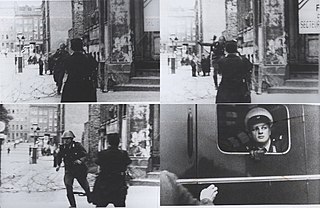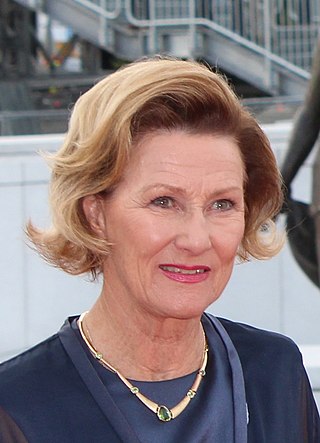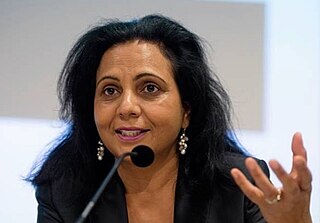Related Research Articles

A refugee, conventionally speaking, is a person who has lost the protection of their country of origin and who cannot or is unwilling to return there due to well-founded fear of persecution. Such a person may be called an asylum seeker until granted refugee status by the contracting state or the United Nations High Commissioner for Refugees (UNHCR) if they formally make a claim for asylum.

Sonja has been Queen of Norway since 17 January 1991 as the wife of King Harald V.

An internally displaced person (IDP) is someone who is forced to leave their home but who remains within their country's borders. They are often referred to as refugees, although they do not fall within the legal definitions of a refugee.

A refugee camp is a temporary settlement built to receive refugees and people in refugee-like situations. Refugee camps usually accommodate displaced people who have fled their home country, but camps are also made for internally displaced people. Usually, refugees seek asylum after they have escaped war in their home countries, but some camps also house environmental and economic migrants. Camps with over a hundred thousand people are common, but as of 2012, the average-sized camp housed around 11,400. They are usually built and run by a government, the United Nations, international organizations, or non-governmental organization. Unofficial refugee camps, such as Idomeni in Greece or the Calais jungle in France, are where refugees are largely left without the support of governments or international organizations.
Danish Committee for Aid to Afghan Refugees (DACAAR)(Danish: Den danske komité for hjælp til afghanske flygtninge) is a non-political, non-governmental, non-profit humanitarian and development organization working to improve the lives of the Afghan people since 1984.

UNITED for Intercultural Action is a European network against nationalism, racism, fascism and in support of migrants and refugees, in which over 560 organisations from 48 European countries cooperate. UNITED was founded in 1992 and provides a forum for active solidarity and cooperation between a wide variety of organisations in Europe and their activists across European borders.
GRID-Arendal is a United Nations Environment Programme partner, located in Arendal, Norway. The Norwegian government created AGRID-Arendal 34 years ago.
Somalis in the United Kingdom include British citizens and residents born in or with ancestors from Somalia. The United Kingdom (UK) is home to the largest Somali community in Europe, with an estimated 108,000 Somali-born immigrants residing in the UK in 2018 according to the Office for National Statistics. The majority of these live in England, with the largest number found in London. Smaller Somali communities exist in Birmingham, Bristol, Manchester, Liverpool, Leicester, Milton Keynes, Sheffield and Cardiff.
The Norwegian Refugee Council is a humanitarian, non-governmental organisation that protects the rights of people affected by displacement. This includes refugees and internally displaced persons who are forced to flee their homes as a result of conflict, human rights violations and acute violence, as well as climate change and natural disasters.
The United Nations High Commissioner for Refugees Representation in Cyprus is an office of the United Nations High Commissioner for Refugees (UNHCR) opened in August 1974 upon the request of the Government of Cyprus and the Secretary-General of the United Nations. UNHCR Representation in Cyprus was designated as Coordinator of the United Nations Humanitarian Assistance for Cyprus. UNHCR was also responsible upon the request of the Cyprus Government to examine applications for refugee status.

Ngô Đình Lệ Quyên, was a South Vietnamese-born Italian lawyer who served as Commissioner of Immigration for the city of Rome.
Husna Parvin Ahmad, OBE is a British humanitarian and writer. She is the CEO of Global One 2015, a women-led INGO. She is Secretary-General of the World Muslim Leadership Forum. She was the chief executive officer of the Faith Regen Foundation.
The Victoria League for Commonwealth Friendship (1901–present) is a voluntary charitable organisation that connects people from Commonwealth countries. There are currently branches in the UK, Australia, and New Zealand with affiliated organisations in Canada and the USA. It is headquartered in Bayswater, London, United Kingdom.

Fakhra Salimi is a Pakistani-born Norwegian human rights activist, feminist, journalist and editor. She is founder and executive director of the MiRA Resource Centre for Black, Immigrant and Refugee Women. The centre has consultative status with the United Nations Economic and Social Council and is under the royal patronage of Queen Sonja of Norway.

The Jordanian Hashemite Fund for Human Development (JOHUD) is the largest and oldest development NGO in Jordan. With 450 employees and around 4000 volunteers, the group maintains a strong presence in Jordan's poorest communities through a network of 51 community centres. JOHUD's work is primarily concerned with poverty reduction, women's rights, creating opportunities for young people, and defending human rights.

The head office of UNHCR's mission in India is located in Delhi, with a field office in Chennai. The current Chief of Mission is Areti Sianni. UNHCR won the Indira Gandhi Prize for Peace, Disarmament and Development in 2015. UNHCR was awarded the Mother Teresa Award for Social Justice by the Harmony Foundation, Mumbai.
BADIL Resource Center for Palestinian Residency and Refugee Rights is an independent, human rights non-profit organization committed to protect and promote the rights of Palestinian refugees and internally displaced persons. BADIL was established in January 1998. According to pro-Israel group NGO Monitor, BADIL is engaging in "lawfare" against Israeli military officials and has also published antisemitic cartoons.
Human rights in Norway protect the fundamental rights of all persons within the Kingdom of Norway. These rights are safeguarded by Chapter E of the Constitution of Norway or Kongeriket Norges Grunnlov, as well as the ratification of various international treaties facilitated by the United Nations. The country maintains a dedicated commitment to human rights and was the second country to ratify the European Convention on Human Rights.